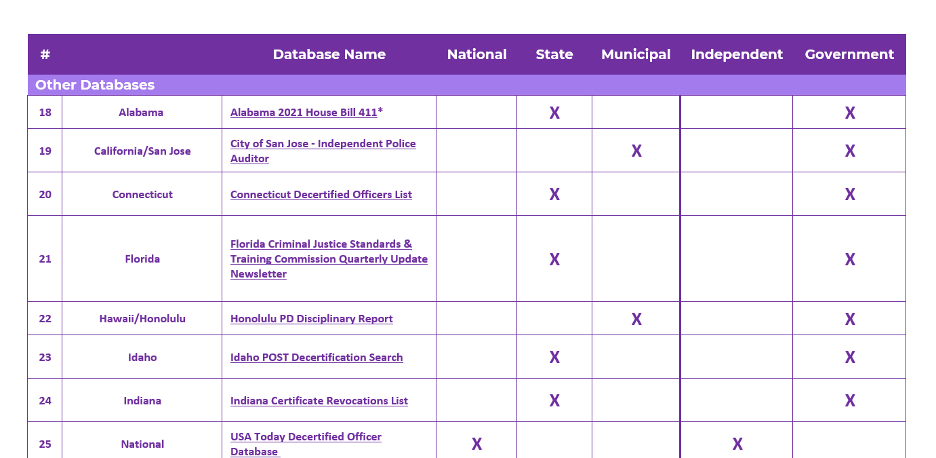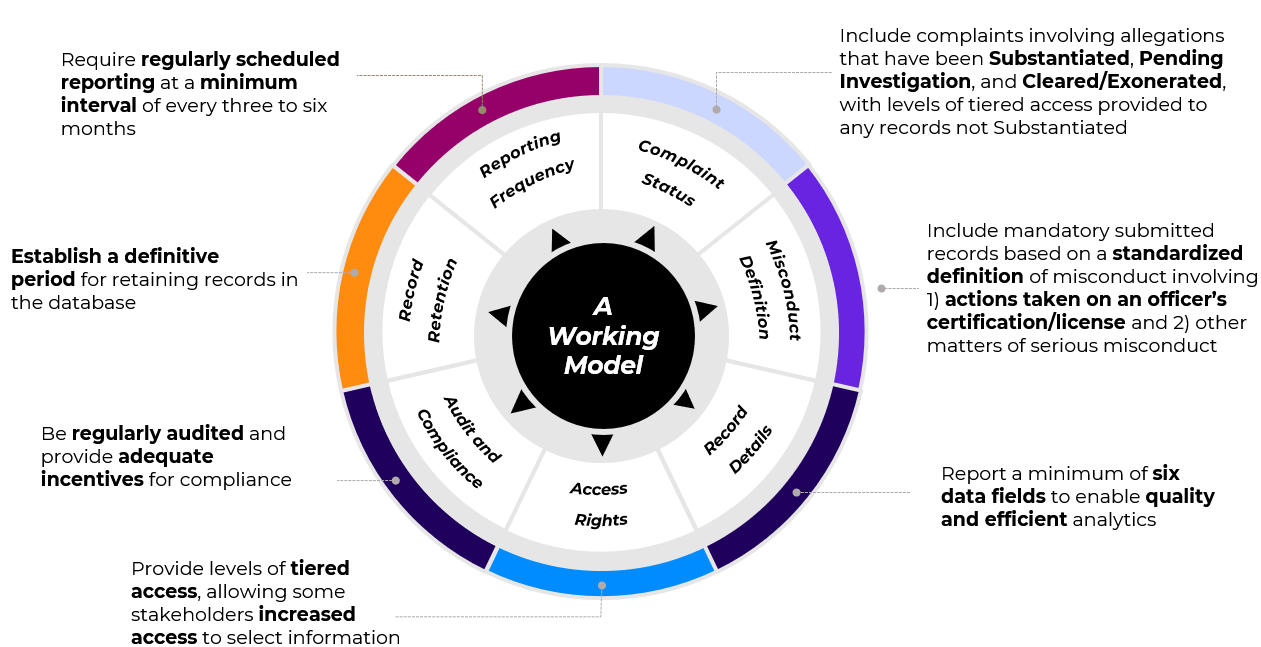Advancing Transparency and Accountability:
A Framework for a Law Enforcement Officer Accountability Database
Law enforcement misconduct costs everyone. Accountability databases can help.
Law enforcement accountability databases have emerged as a solution to the issues of wandering officers, the costs of settling misconduct cases, and the lack of transparency involving law enforcement misconduct. In a report, CEO Action for Racial Equity provides an overview of the policy landscape for law enforcement accountability databases and introduces a novel framework to make these databases a reality at the federal, state and local levels. This one-of-a-kind model shows how accountability databases can be designed to support transparency and build trust between law enforcement and the community.
Wandering Officers Create Public Safety Issues
Accessing law enforcement’s misconduct records is onerous and, in many states, the records are secret. Some state laws restrict or close off public access to officer misconduct records. Hiring chiefs often don’t have the time or resources to access applicant’s prior records. This leaves law enforcement executives at risk for hiring “wandering officers,” those who lose their employment with one agency and find work at another agency. Law enforcement isn’t automatically disqualified from serving as an officer if they’ve been fired, terminated or resigned in lieu of termination. Access to complete and accurate misconduct information is key to making good hiring decisions, safeguarding the public safety and informing future policing policies.
Costly Misconduct Settlements Deprive Communities of Funding
Payments made to settle misconduct lawsuits are not easily accessible and are often not tracked by local municipalities.
$3.2 billion
was paid by the nation’s largest law enforcement and sheriff’s departments during the period of 2010 – 2020.*
This cost deprives communities of funding that could be allocated to support other needs of the community. Claims payments are often concealed, as are the names of the officers involved in the incidents. According to a recent Washington Post report, only four of 25 cities reported on indicated tracking payment information.
* Keith L. Alexander, Steven Rich and Hannah Thacker, “The Hidden Billion-Dollar Cost of Repeated Police Misconduct,” The Washington Post, March 9, 2022, https://www.washingtonpost.com/investigations/interactive/2022/police-misconduct-repeated-settlements/
Lack of Transparency Limits Accountability
A culture of accountability helps to build trust between local law enforcement and the community while also fostering integrity and professionalism among law enforcement officers.
What are stakeholders saying?
Use the scroll arrows to advance to the next stakeholder perspective OR click on the perspective to slow the scrolling speed.
The path to greater accountability and transparency
At the local, state and federal levels, law enforcement accountability databases have emerged as a solution to help address these issues by increasing transparency and accountability. However, there is a need for a framework to advance the policy discussion on how to establish databases. This report shares an inclusive approach to center the dialogue among lawmakers, law enforcement, advocacy organizations, and community members.
In our new report, CEO Action for Racial Equity introduces a novel framework for analyzing the data management and data governance practices of existing and developing accountability databases and proposals for new accountability databases. Our research included three objectives:
1. Assess existing databases to educate and create awareness
Our research uncovered the varied scale and scope of the nation’s landscape on operating and developing law enforcement accountability databases. Across both different levels of jurisdiction and types of administrators, the research revealed very different objectives and use cases for accountability databases and how state freedom of information laws work in providing access to disciplinary records. Our analysis was based on publicly available information obtained through online sources.
Our report’s appendix contains a list of over 30 databases that we have encountered in our research. This is by no means an exhaustive list of all such databases that exist in the United States, but is a valuable resource to understand the wide variation in practices among the databases. A snapshot of the Appendix matrix is included below along with the opportunity to download the full matrix.
Snapshot of Law Enforcement Officer Accountability Database Matrix

+++
Download Full Law Enforcement Officer Accountability Database Matrix
2. Establish a framework for design
For each of the seven design elements, CEO Action for Racial Equity shares recommendations for use by policymakers, law enforcement, advocacy groups and other stakeholders to develop legislation and identify considerations for future reforms to advance transparency and accountability. This is a “Working Model,” and offered as a framework for deeper dialogue on each design element. Promoting transparency builds confidence in and legitimacy of law enforcement.
Data Management
Data Governance
3. Propose a Working Model
For each of the seven design elements, CEO Action for Racial Equity shares recommendations to be used by policymakers in drafting legislation and identifying considerations for future reforms that could advance transparency and accountability. This is a “Working Model,” which can be a starting point to advance future conversations on the topic of law enforcement accountability databases.

Join us in taking action
There is broad support for law enforcement accountability databases across the political spectrum. Through this report, CEO Action for Racial Equity addresses how we can move databases from theory into practice on a national, state and local level. Law enforcement accountability databases are but one type of necessary reform to limit future misconduct and protect the lives and well-being of Black Americans.
Through the Fellowship, businesses across industries and regions are working to find common ground among policymakers, law enforcement, and community members. Share this report. Join us in moving closer to our mission to identify, develop and promote scalable public policies and corporate engagement strategies that will advance racial equality, address social injustice while improving societal well-being.
How to connect with us
Share your comments, questions or interest in collaboration by reaching out to leta@ceoactionracialequity.com







